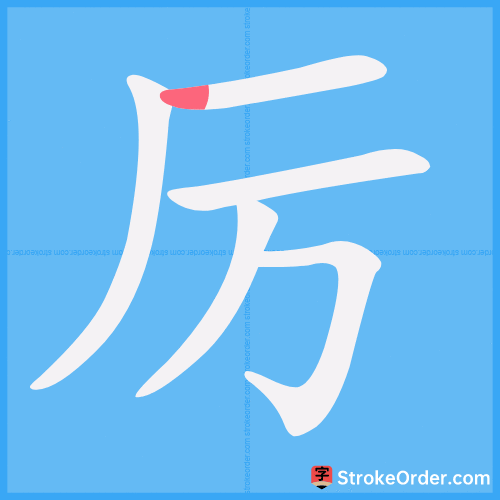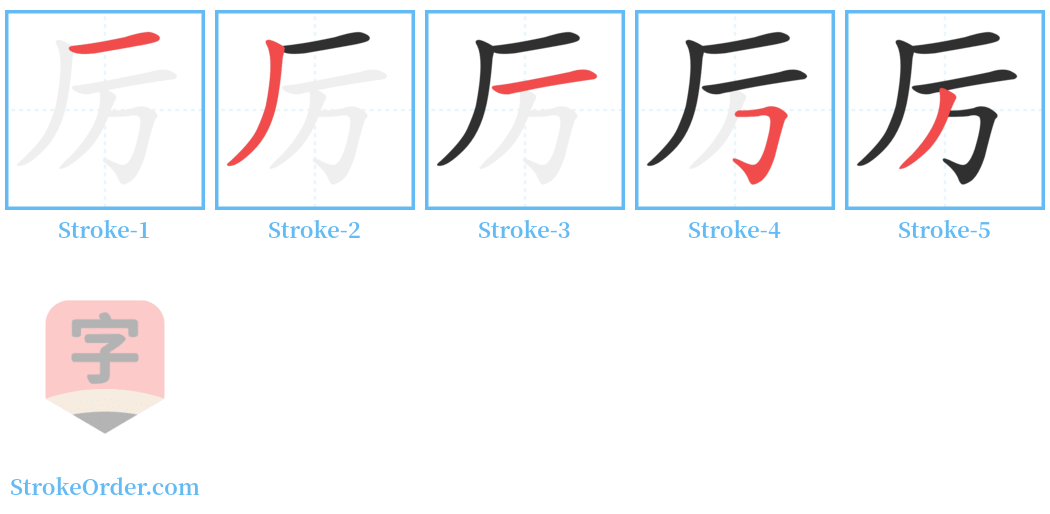厉 Stroke Order
Animated Stroke Order of 厉

Stroke Order Diagrams for 厉

Step-by-Step Handwriting Guide for 厉

Learn to Write Chinese Characters with Video Tutorials
Watch the video of writing the Chinese character "厉", learn the correct stroke order (笔顺) of the character "厉", and master the standard way of writing the character "厉".
Free Printable Handwriting Practice with Stroke Order: 厉
Printable Writing Practice Worksheet of "厉" in Portrait Orientation (Tian Zi Ge)

Printable Writing Practice Worksheet of "厉" in Landscape Orientation (Tian Zi Ge)

Information of 厉
Pinyin
lì
Radical
厂
Strokes
5 strokes
Usage
★★★★★
Definition
severe
厉
lì
1. 严格: strict; e.g., 严禁 (strict prohibition, commanding order).
2. 严肃: solemn; e.g., 声色俱厉 (having a stern demeanor).
3. 凶猛: fierce; e.g., 厉害 (powerful or harmful).
4. 磨,使锋利: to sharpen; e.g., 厉兵秣马 (sharpen weapons and feed horses).
5. 古同“ 疠 ”、“癞”, 恶疮: pestilence; e.g., 苏轼《前赤壁赋》所云 "念天地之苍苍,独立寒秋。萧瑟兮秋风,惨淡兮烟波",可知此处略有"厉"的成分。
6. 姓: surname; e.g., 厉先生 (Mr. Li).
厉
lì
(名)
1. 同本义 (rubstone):磨刀 Stone, rubstone.
2. 祸患;危险 (trouble; danger): 《诗·大雅》有云 "降此大厉"。
3. 恶鬼 (evil ghost): A term for malevolent spirits.
4. 疠,瘟疫,传染病 (pestilence): 常有其类,尤其是突发的。
5. 河岸,水旁;边 (side): 如 "在彼淇厉"。
6. 带,衣带的下垂部分 (band): "垂带而厉",即带子的悬垂部分。
7. 通“癞” (favus): (a type of skin disease).
8. 姓: surname; e.g., 厉家 (Li family).
厉
lì
(动)
1. 磨,磨快 (sharpen): 砺,亦指磨石。
2. 砥砺,磨练 (temper oneself): e.g., 厉行 (to temper one's actions).
3. 同“励” (inspire): e.g., 厉精 (to inspire one's spirit).
4. 激励,勉励 (advise and encourage): 如 "厉节",以品德激励。
5. 连衣涉水 (wade without undressing): "厉揭",即提衣过水。
6. 策,鞭打 (whip): e.g., "厉马",侧重于鞭策。
7. 警惕 (warn): 以警示他人。
8. 疾飞 (fly at high speed): 如同鹰隼的奋勇向前。
9. 害;虐害;损害 (harm; damage): 可用以指责之与祭祀诸居。
10. 得传染病 (suffer from pestilence): 如古代病因学一般而言。
11. 变为恶鬼 (become an evil ghost): e.g., "国为虚厉".
厉
lì
(形)
1. 严厉 (severe; stern): 威严不随和,e.g., "色厉而内荏"。
2. 邪恶 (evil): 自古至今皆有的概念。
3. 猛烈 (violent): 形容其强大;如 "厉风".
4. 恶,凶恶 (ferocious): 如 "梦黄熊入于寝门,其何厉鬼也"。
5. 危险 (dangerous): 时常发生的事件。
6. 味道浓烈 (strong): 诸如"厉而不爽"以形容味道。
lit. change to more severe (idiom); to become more intense (esp. of shortcoming) / to aggravate / to intensify
lit. show strength while weak inside (idiom); appearing fierce while cowardly at heart / a sheep in wolf's clothing
difficult to deal with / difficult to endure / ferocious / radical / serious / terrible / violent / tremendous / awesome
Input Method for 厉
Pinyin
li4
Wubi
ddnv|dgqe
Cangjie
mms
Zhengma
ggay
Four Corner
71227
Unicode
U+5389
Same Pronunciation Characters